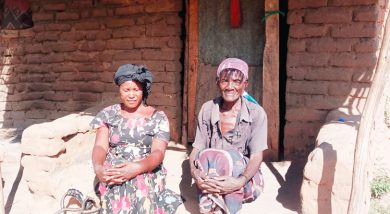Married, but used as a tenant
Brandina Mushani, 41, has no desire to remarry after her former husband made her toil for nothing in a tobacco field.
“I was married and used for a year in a tobacco estate at Bolero,” Mushani, from Ndatondwa Village, Traditional Authority (T/A) Mwalweni in Rumphi, begins her story.
“After harvest, my husband disappeared with all the proceeds. I only realised later that he already had a wife and wanted my services to look after his tobacco farm without paying for labour,” she says.
Mushani recalls how rosy the relationship with her husband used to be, only for the world to crumble at her feet after they tied the knot.

“We were in courtship for a year and thereafter we married. He was such a good man. But things changed afterwards.
“We relocated from Ntchenachena to Bolero where his farm was. Surprisingly, he would visit me once in a while. He would not explain where he was spending his time,” she explains.
That was in 2006. It took her a year to figure out the sort of person her husband was.
“I had half an acre on his four-acre farm where I also grew tobacco. But after harvest, he took my six bales and his [about 20 bales] to the market and disappeared forever.
“I tried to follow up on him, but to no avail. It was painful to realise that he only wanted to use me for cheap labour,” she says.
Mushani says she had invested K50 000 on her portion of the field and would also work on her husband’s farm as well as supervise the other workers.
She reported the case to her husband’s parents who, she says, never assisted. She then reported the matter to Rumphi Women Forum which addresses the plight of women and children in the area of Mwalweni.
The women’s group referred the matter to a victim support unit (VSU) in the area.
“He was told to find me a house and support my welfare, but he never did. We then took the issue to court where he was fined K69 000 for tricking me into labour.
“He was also ordered to give me 12 bags of fertiliser, an equivalent to the tobacco proceeds I realised, and provide support to my nine-year-old child,” she says.
Rumphi is a pre-dominant tobacco farming district where most estate owners depend on labour from the Southern Region.
Mushani’s story, however, opened up eyes for Rumphi Women Forum to pay more attention to abuse in tobacco estates.
The forum’s chairperson Agnes Gama says they have handled 200 similar cases in the past nine years at Mwalweni.
She says most of the cases were settled out of court, whereas 13 went to the courts to the extent that three individuals were convicted and 10 of them fined.
“The problem is that most women don’t know that it is their right to know how tobacco sales have fared on the market,” says Gama.
Ntchenachena, like most rural areas, does not have police units and courts nearby, which is fuelling gender-based violence (GBV), says T/A Mwalweni.
“Courts are far-spaced here and, according to police, women are discouraged from reporting such cases due to long distances that they have to cover to court,” Mwalweni said.
Rumphi Police Station VSU coordinator Tumaleni Thibu said the district registers 30 GBV cases in a month.
Thibu said the cases are usually on the rise during tobacco harvesting period.
“Most of the cases concern women who travel from the Southern Region to work in tobacco farms. So, when they are dumped by their male tenants, we usually offer transport to take them back to their home district,” said Thibu.
Malawi Human Rights Resource Centre (MHRRC) capacity development manager Mercy Makhambera said Mushani’s case is an example of the evils associated with polygamous marriages.
“Such cases are common in areas that promote polygamy. In such marriages, a second wife does not have power to question decisions by the husband.
“In a polygamous marriage, men usually do not provide support to the family and they abscond the home. This is a form of abuse and it needs to be redressed,” she said.
Makhambera said the Prevention of Domestic Violence Act protects women in such cases which can be compared to enslavement.
Ministry of Gender, Children, Disability and Social Welfare admits in its revised National Gender Policy 2015 that “incidences of gender-based violence against women and girls are on the increase despite intensified campaigns and legislation against it”.
In Malawi, women play important roles in agriculture where they constitute 70 percent of full time farmers, carry out 70 percent of the agricultural work, and produce 80 percent of food for home consumption.
However, access to markets for women is limited as a result of transport costs and cultural norms which restrict women’s travel outside their villages, reads an introductory part of the policy.
“The policy will advocate for women’s access to and control over agricultural productive resources, technologies and markets for cash crops, benefits, food and nutrition security,” states the policy which was passed by Cabinet on September 1 2015. n





